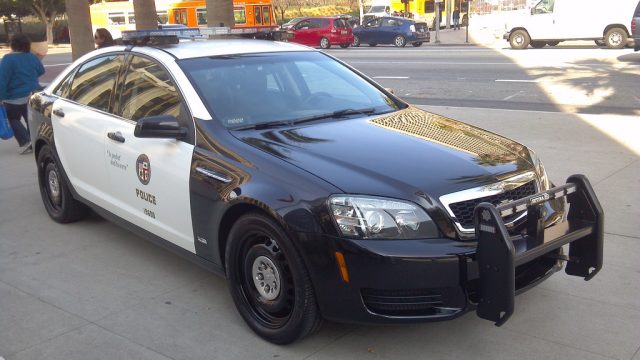
In May 2013, the American Civil Liberties Union of Southern California and the Electronic Frontier Foundation sued the Los Angeles Police Department (LAPD) and the Los Angeles Sheriff’s Department (LASD) in an attempt to compel the agencies to release a week’s worth of LPR data from a certain week in August 2012. The organizations have not determined yet whether they will file an appeal.
The organizations had claimed that these agencies were required to disclose the data under the California Public Records Act. In late July 2012, the ACLU and its affiliates sent requests to local police departments and state agencies across 38 states to request information on how LPRs are used.
"The [LPR] data contains hot list comparisons, the disclosure of which could greatly harm a criminal investigation," Superior Court Judge James Chalfant wrote in his 18-page decision. "It also would reveal patrol patterns which could compromise ongoing investigations, and even fixed point data could undermine investigations. Disclosure could also be used by a criminal to find and harm a third party. Balanced against these harms is the interest in ascertaining law enforcement abuse of the ALPR system and a general understanding of the picture law enforcement receives of an individual from the system, unsupported by any evidence as to how well the ALPR data will show this information. The balancing works in favor of non-disclosure."
Ruthann Robson, a professor of constitutional law at the City University of New York, told Ars that she found the judge's analysis to be "well-reasoned."
"The balancing test exemption—in which the judge weighs the public interest in nondisclosure against the public interest in disclosure—is sure to be appealed," she wrote by e-mail. "It is this type of discretionary balancing of interests about which judges, like other people, can differ. The judge does credit the interests in favor of disclosure, including the potential for abuse, but believes that compromising ongoing criminal investigations and allowing third parties to use the information for ill are more important."
LAPD has 242 car-mounted cameras
As Ars has reported for more than two years, LPRs are used in cities big and small across America. Typically, the specialized cameras scan a given plate using optical character recognition technology, checking that plate against a "hot list" of stolen or wanted vehicles. The device typically records the date, time, and GPS location of any plates—hot or not—that it sees.The cameras scan at an extremely high rate, usually around 60 plates per second. Law enforcement policies vary widely concerning how long that information can be retained. Different agencies keep that data anywhere from a few weeks to indefinitely. Some cities have even mounted such cameras at their city borders, monitoring who comes in and out. Various jurisdictions disagree about whether individuals can access their own LPR records, much less a broader dataset.
In December 2013, the Boston Police Department (BPD) indefinitely halted its use of LPRs following an investigation into their use by the investigative journalism organization MuckRock and the Boston Globe.
The LAPD declared in court that it began testing LPRs in 2004, and it currently has 242 such equipped patrol cars as well as 32 fixed-location cameras. The agency argued that if it was compelled to turn over raw LPR data, "its value as an investigative tool would be severely compromised." Police lawyers argued that a criminal could potentially request information about themselves, "thereby learning whether LAPD has evidence regarding his or her whereabout on a particular date and time or near a particular location. This could result in the potential destruction of evidence."
The court largely agreed with police reasoning, finding that an exemption to the California Public Records Act under Section 6254(f), which protects investigatory files, was warranted.
"The hot list comparisons and targeted mobile car patrol inquiries are just such records of investigation," Judge Chalfant wrote. "Law enforcement is conducting these investigations looking for stolen cars and other evidence of crime. While it is less clear that ALPR data from fixed point and random mobile car patrol cameras are records of investigation, the broad nature of the exemption for law enforcement investigatory records requires their inclusion."
The surveillance state marches ahead
Peter Bibring, an attorney with the ACLU of Southern California, told Ars that he was disappointed in the ruling."We think that if the department is collecting these and collecting them without a warrant, then the public has a right to know how intrusive they are," he said. "This ruling has really broad implications for the surveillance state. It gives law enforcement agencies broad leeway to collect data about innocent, law-abiding citizens. It gives them broad discretion to do that without subjecting their activities to public scrutiny."
Jennifer Lynch, a staff attorney with the Electronic Frontier Foundation, told Ars last year that the week in question was chosen as it was the last week of the Muslim holy month of Ramadan that year.
"There has been quite a bit of government surveillance of Muslim communities in Los Angeles, and I thought getting license plate data from the last week of Ramadan might be able to tell us if the cops were focusing their surveillance efforts on Muslim communities and businesses during that week," she said.
Neither the LASD nor the LAPD responded to Ars’ request for comment.
"New surveillance techniques may function better if people don’t know about them, but that kind of secrecy is inconsistent with democratic policing," Bibring added. "In our democracy, the people should have a right to know what kind of surveillance their departments are undertaking, not in a particular case, but what techniques the police are using to [monitor] people and more broadly, how the police department operates."
reader comments
61